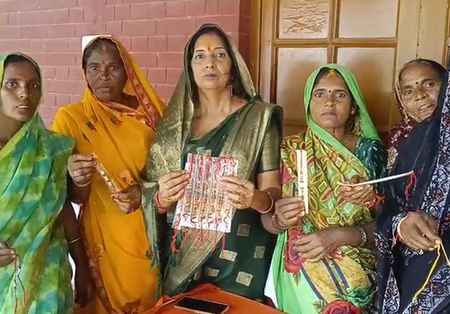
Jaunpur, Aug 8 (IANS) Responding to Prime Minister Narendra Modi’s call to embrace swadeshi, women from Self-Help Groups (SHGs) in rural Jaunpur on Friday have stepped forward to craft colourful, indigenous ‘rakhis’ for this year’s festival of Raksha Bandhan. These handmade creations will not only grace the wrists of brothers across the country but will also be sent to soldiers serving at the nation’s borders.
The National Rural Livelihoods Mission (NRLM), a poverty alleviation programme implemented by the Ministry of Rural Development under the larger Deendayal Antyodaya Yojana (DAY), has been at the forefront of this effort.
Designed to empower rural women socially and economically, NRLM works through SHGs and their federations, enabling poor households to access self-employment and skilled wage opportunities.
In support of ‘Atmanirbhar Bharat’ and ‘Make in India’, NRLM has trained women at SHGs to produce ‘rakhis’. Efforts are also underway to market these products, offering buyers an alternative to imported, especially Chinese, ‘rakhis’ that often dominate festival stalls in India.
Prime Minister Modi had recently renewed his call to adopt swadeshi products. Purchasing India-made ‘rakhis’, officials say, not only boosts the ‘Make in India’ movement but also supports the livelihoods of rural women.
UP Deputy Commissioner of Self Employment, Jitendra Pratap Singh, said that many women had already received ‘rakhi’-making training.
“NRLM will ensure that interested women also have access to markets. We urge everyone to buy indigenous rakhis,” he stated.
He added that on Friday, 1,000 ‘rakhis’ crafted by district SHGs will be dispatched to the country’s soldiers.
For many women, the initiative has been life changing. Saroj Singh, a member of an SHG, shared, “Our group has 120 women working for self-employment. This Raksha Bandhan, we are making ‘rakhis’ to sell in the market, and the income will be shared among us. Alongside this, we have also sent 1,500 ‘rakhis’ to our ‘fauji’ brothers on the border.”
Launched in 2011, DAY-NRLM operates nationwide in mission mode, aiming to include at least one woman from every rural poor household, identified through the Socio-Economic Caste Census (SECC) 2011 and the Participatory Identification of Poor (PIP) process, into the SHG network. These groups are supported in taking up sustainable economic activities, fostering financial independence and community strength.
As of January 31, 2025, around 10.05 crore women have been mobilised into 90.90 lakh SHGs across India.
–IANS
jk/rad



